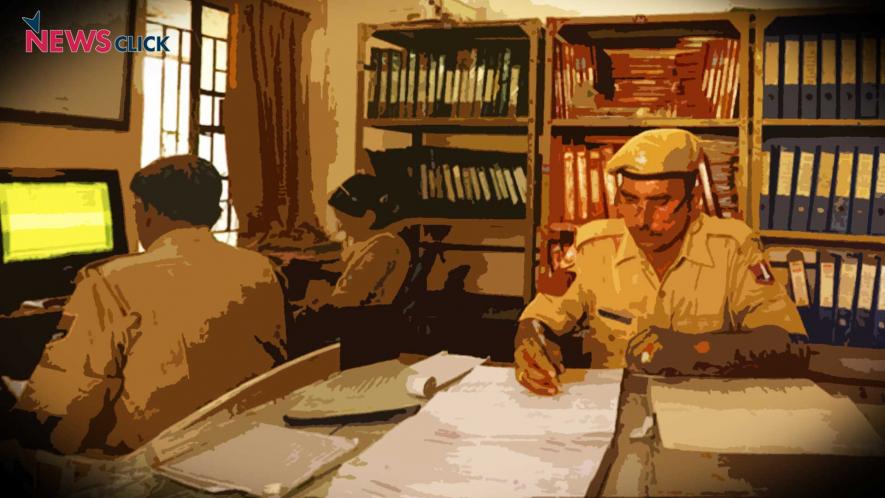Why People Are Afraid To Approach The Police To Report Crimes

Police behavior with 75% complainants, especially women or those from marginalized sections, is not up to the mark causing them to feel reluctant to lodge complaints with police, a study by the Tata Institute of Social Sciences (TISS), Mumbai, has found. It also said that lack of adequate manpower, resources, and linking of performance appraisal with lower crime rates were also factors behind turning away of complainants. However, it recommends the ‘privatisation’ of the lower ranks of the police force in order to augment manpower, a policy that may lead to further fall in standards.
The study, conducted to understand the non-registration of crimes by police, was commissioned by the Bureau of Police Research and Development (BPR&D), under the home ministry. Survey work was done in six states – Uttar Pradesh, Assam, Odisha, Delhi, Tamil Nadu and Maharashtra – representing different zones of the country. The survey involved taking the views of 506 persons of which 207 were complainants and the rest were police personnel and NGO activists.
The study identified the following reasons for non- registration of cases:
Shortage of manpower and heavy workload: The study stresses the importance of filling up vacancies in the police departments in different states. In a reply to the parliament question on the number of vacancies in the police department, the Home Ministry replied on 21st March, 2017 that there were 5,49,025 vacant police posts in the country. The highest vacancies were reported from Uttar Pradesh 50%, Karnataka 36% West bengal 33%, Gujarat 32%, Haryana 31%.Instead of suggesting better pay scales and more recruitment, the report embraces the neo-liberal mantra of privatisation of the lower-end of police services, just like the recommendations made by diverse committees of the present government for solution to diverse problems. “[T]he private security personnel can act as force multipliers, provided the police organizations devise working mechanisms to enlist their time and energies,” says the report. Speaking on this recommendation Abhay Xaxa from National Campaign for Dalit Human Rights( NCDHR) says “This is against the basic responsibility of the State. It cannot privatise the issue justice and transfer that duty to a private body. Our organization fights for the Rights of Dalits and Adivasis and we expect the state to full its constitutional responsibility have always demanded strengthening of laws like Prevention of Atrocities Act etc.”
Inadequate resources for police: The report says that funding to the police has always been neglected by government while allocating funds. “Police Departments have been ranked low in Government funding priority as these are treated as non-productive units and are a matter of drain on the State exchequer.” This is the reason behind shortage of manpower and infrastructure, etc. which affects functioning of the police system.
Performance appraisal vs crime rates: The report finds that linking of crime rates with performance appraisals of the police personnel was one of the important reasons for non-registration of cases. It recommends implementation of the “Model Police Act” - operational efficiency, public satisfaction, victim gratification vis-à-vis police investigation and response, accountability, optimum utilization of resources, and human rights record – to evaluate the police personnel.
Police behaviour with complainants: The report said that more than 75% people, especially women and those from marginalised sections, felt that police behaviour towards them was not good and hence were averse to approaching the police unless they had to report a serious crime. The report captures the social biases that exist in the society. It says that many Duty Officers are of the opinion that “In India people generally treat the other person according to his/her socio-economic status based on caste lines. People from upper caste and/or rich and politically or otherwise influential always get good treatment everywhere. Police officials also come from the same social milieu. How could you expect the police to treat equally all the citizens, in a dignified manner, when they themselves are not getting dignified treatment from their own superior officers as well as from the public.”
This attitude of the police has been highlighted by the ordeals faced by people from North-East India living in Delhi, for example. A study ‘North East migration and challenges in National Capital: City's silent racial attack on its own countrymen' highlighted instances about people from these regions feeling that they were discriminated against by the police it. In-order to remedy the problem of racial discrimination faced by people from the North East, the Bezbaruah Committee recommended that members from the North East be recruited in the Delhi Police. As part of that initiative, the Delhi Police recruited 435 men and women from that region.
Indeed, if the policy makers intend to address the issue of discrimination faced by the citizens from marginalized communities, efforts have to be made to recruit police personnel from these communities as a first step to creating a healthy inter-personnel relations among the police, so that inherent prejudices can be addressed.
On the issue of minorities, the TISS report states that “in case of Muslim complainants, no action was taken or known to have been taken in case of 32% of their reports. This data suggests that Police being part of same milieu, seem to maintain similar discrimination on the basis of case and religion, though law enforcers are expected to be more impartial in the interest of justice.”
Another report was prepared by the DGPs of three states and an officer from the IB on the issue of “minorities and police”. The report, according to the Indian Express, states that the committee recommended measures to bridge the “police-community” gaps and to develop “standard operating procedures (SOPs) to prevent communal riots.”
The TISS report also revealed that police officials recognise the practice of suppressing of crimes called ‘burking of crime’ in police parlance. The reason, said officers, is the prevalent understanding that the higher cases registered mean a rise in crime.
“If we compute ‘non-reporting along with ‘non-registration’ of crime, it is feared that only less than 10% of crime happening in the Society is getting registered,” it said.
The TISS report gave an example of an officer of the rank of an Inspector General of Police (IGP). The officer was admonished in his initial days, while he was posted as a Superintendent of Police of a district, when he instructed all the police stations under his jurisdiction to register all cognizable crimes. Within a few a months, the crime graph jumped up by four times. The officer was scolded and was asked for an explanation by his seniors.
“He was also warned by the seniors that if he wanted a smooth career this should not be repeated in future,” the report says.
Get the latest reports & analysis with people's perspective on Protests, movements & deep analytical videos, discussions of the current affairs in your Telegram app. Subscribe to NewsClick's Telegram channel & get Real-Time updates on stories, as they get published on our website.
























